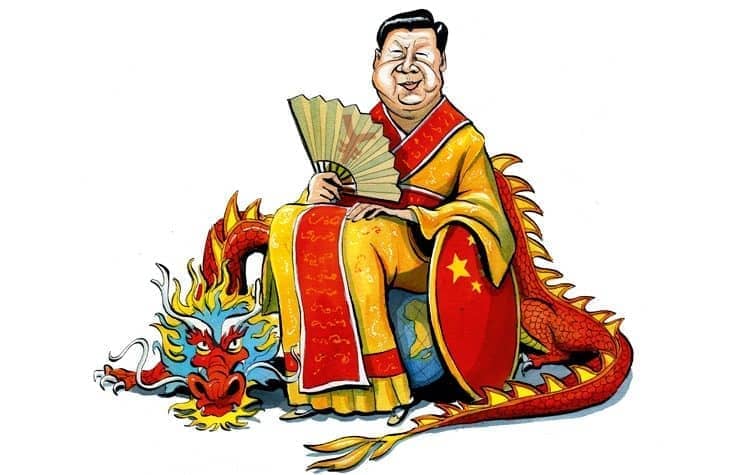On Monday in the city of Bridgetown, Prince Charles will be forced to witness the spectacle of Barbados officially becoming a republic as it removes the Queen as its head of state. The former British colony became independent in 1966, but last year the country’s Prime Minister Mia Mottley announced that the country would have its own president, though it will remain a member of the Commonwealth.
The decision appears to have been influenced to some degree by China’s activities. Barbados has signed up to China’s Belt and Road Initiative (BRI), while an office to facilitate investment in Barbados has opened in Beijing. Prime Minister Mia Mottley calls President Xi ‘very engaging’. Barbados was among the first English-speaking Caribbean countries to establish ties with China and Beijing is now making millions of dollars’ worth of donations to the country’s armed forces.
But Barbados is not the only Commonwealth country which has attracted China’s attention. In fact China is increasingly developing military and diplomatic links with Commonwealth states and its military training institutes are taking in growing numbers of foreign students.
In April, the Fiji Times noted that two of the country’s highest-ranking officers, including the Acting Land Force Commander, had obtained masters in military science degrees from a Chinese military institution.
China’s expanding military training programmes are likely to have a serious impact on the democracy and governance of Commonwealth countries
In Namibia, Beijing has funded the country’s Command and Staff College. It is offering steadily more training programmes to Sri Lanka’s soldiers and has partnered with the ruling parties of South Africa, Zimbabwe, Mozambique and Namibia to fund Tanzania’s Mwalimu Nyerere Ideological School, once a training centre for African anti-colonial movements, which will train 400 officers and civilians annually. In Uganda the Oliver Tambo Leadership Academy is a China-sponsored ‘politico-military school’. China has also begun training Kenya’s paramilitary National Youth Service.
Other Commonwealth countries receiving Chinese military training include Cameroon, Rwanda, and Guyana. In Barbados, the PLA is making growing donations to the armed forces, whose members are also joining training courses in China.
When Commonwealth soldiers are in China they are often induced to make ‘public commitments’ in the state run press. Commonwealth soldiers interviewed by the nationalist Global Times in 2019 have expressed admiration for China’s development, criticising the West’s attitude towards both China and their own countries. Nigerian sailors studying in China criticised the methods the United States uses to help fight Boko Haram and suggested China will have the most powerful military in the world by 2050. Military programmes even aim to persuade Commonwealth officers that China has a better human rights record than the West.
In ex-Commonwealth Zimbabwe, China’s influence goes much further. There is evidence to suggest that the historic relationship China has developed with the country’s military may have allowed Beijing to help determine the government itself. Before leading the coup that ousted Robert Mugabe, Emmerson Mnangagwa visited China, where he was joined by the Zimbabwean general Constantino Chiwenga. When the two returned they moved against ‘Old Man’ Mugabe.
Mnangagwa claims to have been friendly with four generations of Chinese leaders: he and Chiwenga both received military training in China and were tied to its business projects in Zimbabwe.
After Mugabe was ousted, western investors welcomed the opportunity to invest in Zimbabwe again. But they must now negotiate Mnangagwa’s ‘hybrid economy’ – a military-civil corporatism run on Chinese lines. Zimbabwe’s security forces have resumed their routine violence against civilians and the country’s 2018 application to re-join the Commonwealth is being discussed.
Zimbabwe may be an extreme case, but using military education to influence countries around the world is now standard practice for Beijing. China’s military education programmes were first formed in the 1950s when the communist state tried to influence anti-colonial movements in the third world. Chinese military influence subsequently declined in importance until Beijing’s recent turn towards greater expansionism.
But Commonwealth governments are now sending growing numbers of soldiers to train in China. Officers who are seen as future high-fliers are sent to study at elite institutes like the National University of Defence Technology in Hunan province, an institution whose research links to UK universities have been documented elsewhere.
China is paying ever more attention to countries which the UK has been neglecting for decades. The fact that the Barbadian High Commission sits on a dingy side-street off Tottenham Court Road will not have helped endear its dignitaries to Britain.
China’s expanding military training programmes are likely to have a serious impact on the democracy and governance of Commonwealth countries. With the UK beginning to look outward once again, the Commonwealth should also examine how best it can promote liberal and democratic norms in the years ahead.





Comments